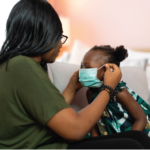
pimchawee / shutterstock.com
As if the fatigue, joint pain, etc., were not enough, new research has found many lupus patients must contend with clinical depression as well—something that can have a devastating cascade effect on other areas of their lives.
Are adults with childhood-onset lupus at greater risk of depression than lupus patients with onset of disease during adulthood? A team of researchers from Children’s Hospital of Philadelphia (CHOP) and the University of California, San Francisco (UCSF) were determined to find out. The scientists examined a group of 546 young adults with systemic lupus erythematosus (SLE) who were 18–45 years old. The group, which completed annual telephone surveys from 2002–2015, included 115 individuals who had juvenile-onset SLE (age <18 years at diagnosis).
The study, “Depression Risk in Young Adults with Juvenile- and Adult-Onset Lupus: Twelve Years of Followup,” appears in the March 2018 edition of Arthritis Care & Research.
Lupus in the Brain
Erica Lawson, MD, is a pediatric rheumatologist with UCSF, and was a co-author of the research. “Clinically, there is an interesting cognitive component to lupus that makes it different from many other rheumatologic diseases,” she says. “Lupus is well known to involve the central nervous system in a wide spectrum of ways, from overt seizures and psychosis to vague complaints of cognitive slowing, or ‘lupus fog,’ when patients don’t feel quite with it. It can be challenging to determine in each patient whether mental health issues are related to the disease process vs. a primary psychiatric disorder. As pediatric rheumatologists with an interest in long-term lupus outcomes, Dr. [Andrea] Knight and I wanted to know if individuals who develop lupus during childhood could be at particularly high risk of mental health disorders in adulthood.”
In the study, researchers “sought to identify differences in depression risk between young adults who develop lupus as children and those who became sick during adulthood,” Dr. Lawson continues. “Interestingly, even when we controlled for the other demographic and disease-related factors, the childhood-onset of lupus was correlated with an increased prevalence of depression. It may be that lupus activity in the developing brain, as occurs in patients with childhood-onset lupus, has a significant, long-term impact on mental health. Increased depression risk in the childhood-onset group could also be linked to the stress of having had lupus for a very long time, including the impact on social, educational and vocational outcomes.”
Education Level a Predictor
“The most startling thing,” says Dr. Lawson, “was the strong association we found between educational attainment and depression. In fact, in this cohort of patients from 18–45 years of age the strongest predictor of depression was educational attainment. Among patients who had childhood-onset of lupus and less than a high school education, there was a 50% prevalence of major depression. For those who attained a college degree or higher, the prevalence was 10%. We cannot glean the exact causes, but we are wondering, for example, if someone became depressed at the time the lupus began, does that account for their lower educational attainment? Or are we seeing that these patients are not able to go far in school or work in part due to being sick, which could subsequently lead to depression, increased life stressors and low socioeconomic status?”
The researchers also considered “other factors potentially associated with depression risk,” she says. “Older age, physical function, higher disease activity and a history of smoking were also associated with an increased risk of depression. Disease activity demonstrated a particularly strong correlation with depression, which again could be due to biologic effects of lupus on the brain, the stress of living with active lupus, poor medication adherence among depressed individuals or most likely a combination of factors.”
Another interesting finding: “The increased risk of depression in individuals with childhood-onset lupus was seen even after accounting for disease duration and activity,” Dr. Lawson says. “It seems there is something about the connection between the early onset of lupus and depression risk that is not just about the disease activity or duration. When it comes to depression, there’s something different about adults with lupus who have had this disease since they were kids.”
Andrea Knight, MD, is an assistant professor of pediatrics at the University of Pennsylvania Perelman School of Medicine in Philadelphia, a CHOP faculty member, and a co-author of the study. Dr. Knight’s work is targeted toward improving mental healthcare for children and adolescents with lupus.
“We know from other work that depression can impact medication adherence and healthcare utilization,” Dr. Knight says. “And the fact that physical functioning was lower and disease activity was higher in those with an increased risk of depression is telling. Further research is needed before we can tell exactly what direction things are going; in other words, is the depression causing decreased functioning (e.g., poor medication compliance, more disease), or is it the reverse. But the fact that it is highly associated means it is imperative we address the depression.”
Raising the alarm, Dr. Knight says, “Another study I was involved with examined how many pediatric rheumatology sites in North America have a social worker or a psychologist. The results were dismal—only one of three sites had a professional affiliated with their division. This should give us pause [because] here is a patient population with known mental health needs. We can’t leave these patients and their families without the resources they need. This work will help us go forward and investigate how to design interventions to best support those in need.”
‘The most startling thing was the strong association we found between educational attainment & depression.’ —Dr. Lawson
Family Matters
“When children are diagnosed with lupus in the early adolescent years, the family involvement factor is still a major consideration,” Dr. Knight says. “The more that parents and/or caregivers can create a supportive environment, the better children fare with this complex disease. The family’s socioeconomic, educational and emotional health status are all important in maximizing their ability to coordinate the young person’s care.”
Dr. Knight is “also involved in work surveying adolescent lupus patients and their parents, and talking to behavioral health providers who work with these families. All of them are telling us the diagnosis of lupus is a substantial psychological adjustment regardless of socioeconomic status, educational level or race. It is critical to get families involved early on so they feel empowered in adjusting to and managing this disease.”
In addition, Dr. Knight believes, “Strategies to increase mental health awareness and screening among adolescents with lupus [are] needed, and resources such as family therapy and peer support groups for adolescents and caregivers are some of the ways we can help families and patients. Because lupus involves flares and ups and downs, it’s a condition that requires ongoing attention to both the physical and mental aspects of the disease.”
Elizabeth Hofheinz, MPH, MEd, is a freelance medical editor and writer based in the greater New Orleans area.

